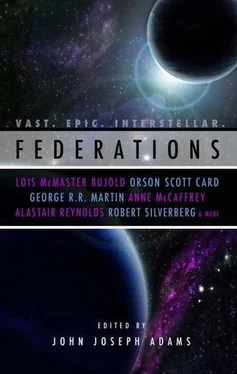“The Concert teaches that the fermata is our greatest form of immortality—”
“Dead is dead,” Swan said. “At this end of time, what is the hurry?”
The door whisked open. Swan looked away from the ship’s image and met Tiger’s curious eyes.
“Damn, ’Zhien,” Tiger said respectfully. “So you found the courage after all.”
“That’s not it,” Swan said. “The symphony wasn’t supposed to be about the glory of death.”
Loftily, Tiger said, “Oh, I’d never perform suicide art. There’s nothing pretty about death. You learn that in battle.”
After a silence, Dragon said, “What did you intend, then, Swan?”
The question brought her up short. She had been so absorbed in attempting to convey the swanships’ grandeur that she had forgotten that real people passed into the fermata to send their souls to the end of time. “I’ll change my music,” she said. “I’ll delete it all if I have to.”
“Please don’t,” Dragon said. “I would miss it greatly.” A faint swelling of melody: his ship was playing back one of her first, stumbling efforts.
“You’ll miss it forever if you keep going.”
“A bargain, then,” Dragon said. “I was never an artist, only a soldier, but a hundred years here have taught me the value of art. Don’t destroy your music, and I’ll come back.”
Swan’s eyes prickled. “All right.”
Tiger and Swan watched as Dragon’s ship decelerated, then reversed its course, returning to the station.
“You’ve sacrificed your freedom to bring him back, you know,” Tiger said. “If you finish your symphony now, it will lack conviction. Anyone with half an ear will be able to tell.”
“I would rather have Dragon’s life than write a masterpiece,” Swan said.
“You’re a fool, cygnet.”
Only then did Swan realize that, in her alarm over the situation, she had completely forgotten the theme she had meant to record.
• • •
Dragon helped Swan move the keyboard out of the observation room and into the rock garden. “I’m glad you’re not giving up your music,” he remarked.
She looked at him, really looked at him, thinking of how she had almost lost a friend. “I’m not writing the symphony,” she said.
He blinked.
“I’m still writing music,” Swan assured him. “Just not the captain’s symphony. Because you were right: it’s impossible. At least, what I envisioned is impossible. If I dwell upon the impossible, I achieve nothing. But if I do what I can, where I can—I might get somewhere.”
She wasn’t referring to freedom from the swanwatch.
Dragon nodded. “I think I see. And Swan—” He hesitated. “Thank you.”
“It’s been a long day,” she said. “You should rest.”
“Like Tortoise?” He chuckled. “Perhaps I will.” He ran one hand along the keyboard in a flurry of notes. Then he sat on one of the garden’s benches and closed his eyes, humming idly.
Swan studied Dragon’s calm face. Then she stood at the keyboard and played several tentative notes, a song for Dragon and Phoenix and Tiger. A song for the living.
SPIREY AND THE QUEEN
by Alastair Reynolds
Alastair Reynolds is the author of eight novels and about thirty short stories. His fiction frequently shares the setting of his novel Revelation Space . His stories have appeared mostly in the British magazine Interzone , but also in several anthologies, such as The New Space Opera , Eclipse Two , One Million A. D. , and Constellations . He is a winner of the British Science Fiction Award, and his work has often been reprinted in the various best-of-the-year annuals.
In his collection, Zima Blue and Other Stories , Reynolds says that “Spirey and the Queen” was a “pig” to write, and that it was a relief to get it out of his system. “The motor of plot only kicked in when I started looking at the story in thriller terms: spies, defectors, that kind of thing,” he said, and added that he always had the vague intention of returning to the milieu someday, if only to find out what happens after the last line of the story.
Space war is godawful slow .
Mouser’ s long-range sensors had sniffed the bogey two days ago, but it had taken all that time just to creep within kill-range. I figured it had to be another dud. With ordnance, fuel, and morale all low, we were ready to slink back to Tiger’s Eye anyway; let one of the other thickships pick up the sweep in this sector.
So—still groggy after frogsleep—I wasn’t exactly wetting myself with excitement, not even when Mouser started spiking the thick with combat-readiness psychogens. Even when we went to Attack-Con-One, all I did was pause the neurodisney I was tripping ( Hellcats of Solar War Three, since you asked), slough my hammock, and swim languidly up to the bridge.
“Junk,” I said, looking over Yarrow’s shoulder at the readout. “War debris or another of those piss-poor chondrites. Betcha.”
“Sorry, kid. Everything checks out.”
“Hostiles?”
“Nope. Positive on the exhaust; dead ringer for the stolen ship.” She traced a webbed hand across the swathe of decorations that already curled around her neck. “Want your stripes now or when we get back?”
“You actually think this’ll net us a pair of tigers?”
“Damn right it will.”
I nodded, and thought: She isn’t necessarily wrong . No defector, no stolen military secrets reaching the Royalists. Ought to be worth a medal, maybe even a promotion.
So why did I feel something wasn’t right?
“All right,” I said, hoping to drown qualms in routine. “How soon?”
“Missiles are already away, but she’s five light-minutes from us, so the quacks won’t reach her for six hours. Longer if she makes a run for cover.”
“Run for cover? That’s a joke.”
“Yeah, hilarious.” Yarrow swelled one of the holographic displays until it hovered between us.
It was a map of the Swirl, tinted to show zones controlled by us or the Royalists. An enormous, slowly rotating disk of primordial material, 800 AU edge to edge; wide enough that light took more than four days to traverse it.
Most of the action was near the middle, in the light-hour of space around the central star Fomalhaut. Immediately around the sun was a material-free void that we called the Inner Clearing Zone, but beyond that began the Swirl proper: metal-rich lanes of dust condensing slowly into rocky planets. Both sides wanted absolute control of those planet-forming Feeding Zones—prime real estate for the day when one side beat the other and could recommence mining operations—so that was where our vast armies of wasps mainly slugged things out. We humans—Royalist and Standardist both—kept much further out, where the Swirl thinned to metal-depleted icy rubble. Even hunting the defector hadn’t taken us within ten light-hours of the Feeding Zones, and we’d become used to having a lot of empty space to ourselves. Apart from the defector, there shouldn’t have been anything else out here to offer cover.
But there was. Big, too, not much more than a half light-minute from the rat.
“Practically pissing distance,” Yarrow observed.
“Too close for coincidence. What is it?”
“Splinter. Icy planetesimal, you want to get technical.”
“Not this early in the day.” But I remembered how one of our tutors back at the academy put it: Splinters are icy slag, spat out of the Swirl. In a few hundred thousand years there’ll be a baby solar system around Fomalhaut, but there’ll also be shitloads of junk surrounding it, leftovers on million-year orbits.
Читать дальше












